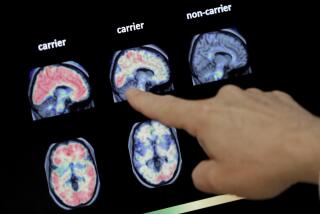The Alzheimer’s Information Gap
- Share via
Doctors may know more than ever about Alzheimer’s disease, but family members of patients--usually their primary caretakers--feel as if they aren’t benefiting, according a new survey.
“There’s a huge gap between what doctors think they are telling their patients and what caregivers say they are hearing,” said Orien Reid, chairwoman of the board of directors of the Alzheimer’s Assn.
The survey was based on interviews with 376 caregivers and 500 primary care physicians. The Alzheimer’s Assn., Janssen Pharmaceutica and Ortho-McNeil Pharmaceutical sponsored the study, which was reported Thursday in New York City.
The majority of physicians--84%--said they believed that they provided detailed information on the disease and what families could expect. But only a third of caregivers reported receiving such information.
Ninety-one percent of physicians said that they provided information about drug treatments to help keep symptoms from worsening, yet only 24% of patient families said they got that information.
“There seems to be a major disconnect between caregivers and the doctors,” Reid said.
Many factors could be involved.
“Doctors need to give information in the right dose at the right time--just like medications,” Reid noted.
Stephen McConnell of the Alzheimer’s Assn. said that patients and their caregivers have the right to expect a detailed explanation of the diagnosis; the available treatments; and to have a conversation about the legal, financial, social and health-care problems that families will face as the disease progresses.
The organization is now embarking on educational programs for both doctors and caregivers to strengthen this relationship.
The more caretakers know and feel comfortable asking, the less stress they will feel, added Steven Zarit of Pennsylvania State University.
Zarit said that three in every 10 caregivers have no outside help. His studies and others suggest that between 40% and 70% of caregivers have high levels of depression, anxiety and feelings of anger. The stress of caring for demented loved ones, a round-the-clock job, could explain why caregivers appear to have higher death rates than others their age.
The Alzheimer’s Assn. now has social workers available around the clock to help caregivers. The number is (800) 272-3900.
The association also recommends reducing stress by using respite care, adult day-care programs or home health aides.
More to Read
Sign up for Essential California
The most important California stories and recommendations in your inbox every morning.
You may occasionally receive promotional content from the Los Angeles Times.













